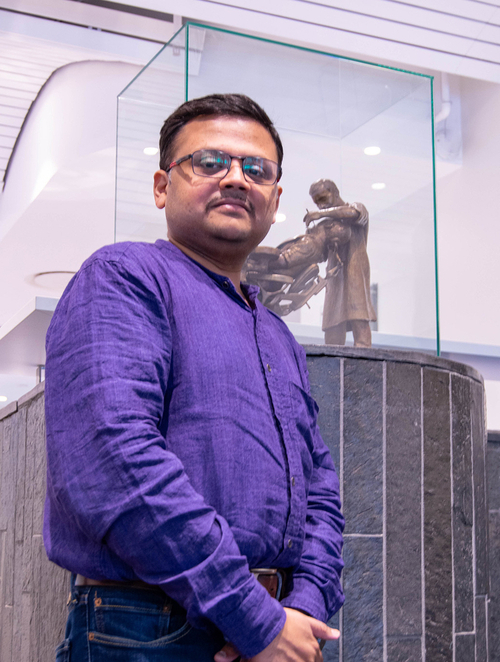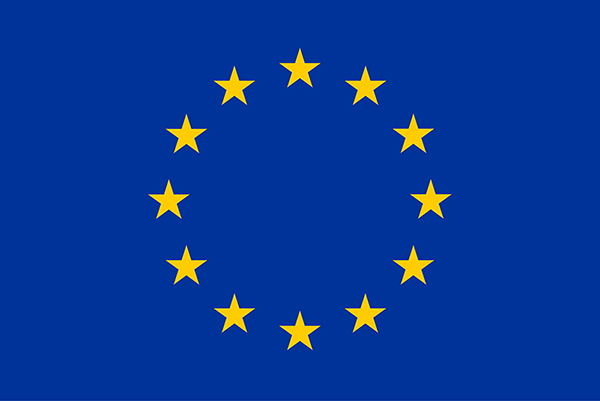
Probal Basu, our new Marie Curie postdoctoral fellow, joined our research team at the Department of Biomaterials in the beginning of July. When asked how he would describe himself, Probal reveals a surprising side of himself:
- I’m biomaterials researcher by profession but a poet at heart. While I am originally from Kolkata, India, I have travelled a long way to find myself here at the Department of Biomaterials in Oslo. After completing my bachelor and master degrees in biological science in India, I felt the need to develop my skills as an independent academic researcher and moved to Czech Republic to do my PhD at Tomas Bata University in Zlín. It was during my doctoral studies when I was first introduced to the world of tissue engineering and developing cellulose-based biomaterials for this purpose. I continued working with cellulose also during my time as a postdoc researcher at Chalmers University of Technology in Sweden, where I worked with processing cellulose fibres for biomedical and biorefinery industries, Probal explains.
Bioactive multiphase membranes for periodontal regeneration
Cellulose is also at the heart of MultiphaseGTR, a research project funded by EU's Marie Skłodowska-Curie Actions (MSCA), which also brings Probal back to working with biomaterials intended for tissue regeneration. This project focuses on developing a new type of bioactive membrane material that can be used to guide the regeneration of the tissues that hold teeth in place in the jaw. As loss of the supporting bone and connective tissues is typically caused by chronic inflammation caused by bacteria adhering and accumulating onto the root surface, the developed membrane will need to serve many functions. On the one hand, the membrane should support wound healing and growth of new bone around the tooth, but on the other, it should prevent growth of gingival tissue along the tooth root and block the access of bacteria from the oral cavity to the wound site. The aim of the project is to combine cellulose-reinforced hydrogels with different chemistries and mechanical properties to create a multilayered membrane that achieves all of these functions.
The main reason Probal decided to partner with the Department of Biomaterials for his Marie Curie project was our strong reputation and research expertise in developing biomaterials for bone regeneration, especially in dental applications, as well as the well-equipped laboratory facilities we available for researchers on-site.
- Since I started working with biomaterials during my PhD, I've followed the published research work from this department. Especially the research conducted by Hanna Tiainen caught my interested and made me want to learn more about developing and characterising hydrogel-based bioactive materials for tissue regeneration. That is why I chose to write my Marie Curie proposal together with Hanna, Probal says.
Chance to learn something new
Exchange of knowledge is a central part of Marie Curie fellowships. Learning new research skills at the Department of Biomaterials is an important step for Prabal on his academic journey towards becoming an independent researcher, but he does not come to our lab empty-handed:
- During my PhD and previous postdoc projects, I have gained a lot of knowledge and experience in working with cellulose-based materials and template-mediated mineralisation, which is something I bring to the table. In exchange, I will learn about designing functional materials intended for specific clinical applications and testing the biological effects these materials have on the surrounding tissues and cells. Also, the clinical applicability of the developed membrane will be very important to the project, so I'm looking forward to many fruitful discussions and research collaborations with other researchers at the Faculty of Dentistry, Probal continues.
Winter is coming!
Few months is enough time to get a pretty good impression of life in Norway. When Probal first arrived in Oslo, the city was curiously empty and not many people were to be found at the university with most of his colleagues being on summer vacation.
- When I first moved to Oslo in July, the weather was very pleasant and I enjoyed walking around the city with my wife among the summer tourists that were in town. But deep down I also knew that the sunny weather is not going to last forever and winter will eventually come... Now that the days have become much colder and shorter, I really appreciate the efficient public transport in Oslo, which makes it easy to get around even when the weather is bad, Probal says.
Probal can also take comfort in the spicy flavours from home:
- I was very happy when I realised that in Oslo I can find all the Indian spices and ingredients to cook the kind of food I was used to having back home in India. Although I was a bit surprised to find out how much more expensive food is Norway compared to Sweden, where I lived before. But overall, I find Oslo a beautiful city to work and live in. I'm also looking forward to exploring more of Norway, and of course, hopefully being able to see the northern lights during my stay here!
But before we finish, we do need to get back to the poet thing. At the beginning of this little interview, Probal mentioned that there beats a heart of a poet inside of him. Obviously, we wanted to learn more about Probal’s hidden talents and had to ask if he would be willing to provide us a small sample of his poetry skills:
Slipped down from the commas to semicolons
Looped between the names and renames
Sometimes bonded
Sometimes free
I smoothen myself for the friction
Between the world’s wants and needs.
Dr. Probal Basu, 02.06.2023
 |
This project has received funding from the European Union's Horizon Europe research and innovation programme under grant agreement No 101108847. |